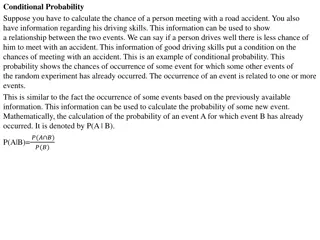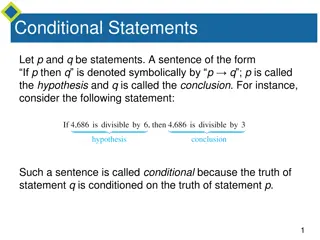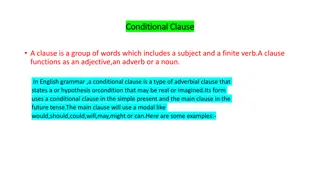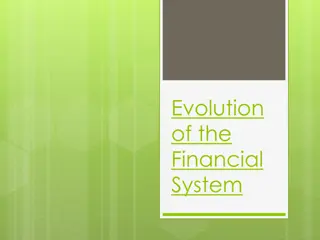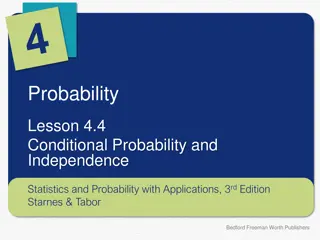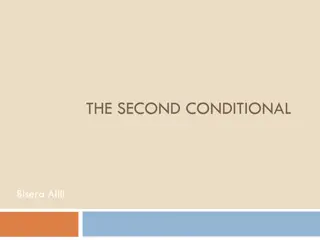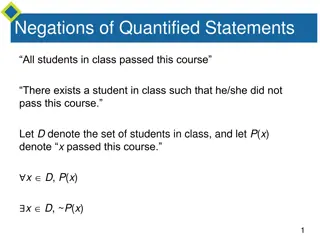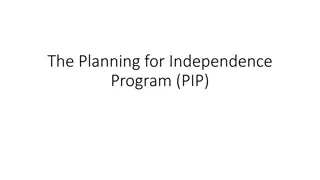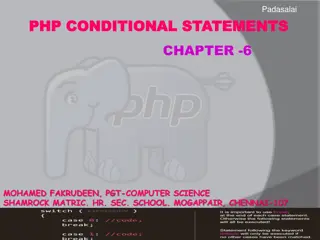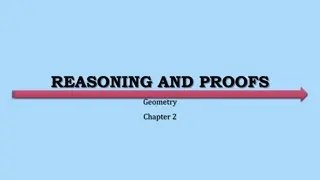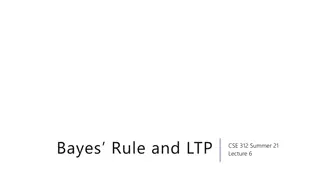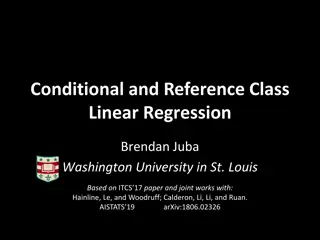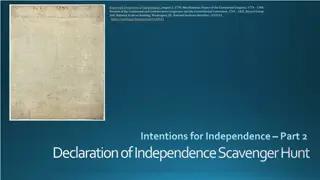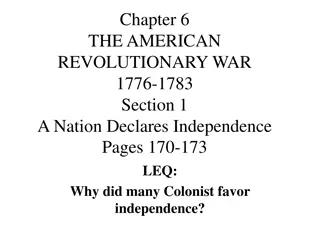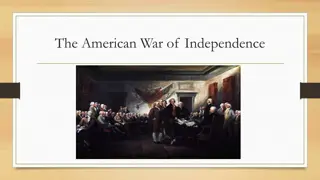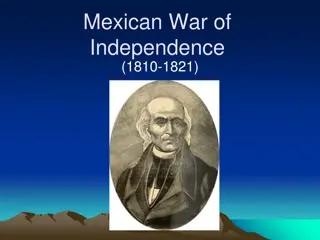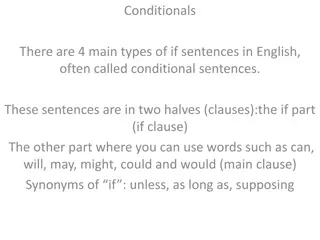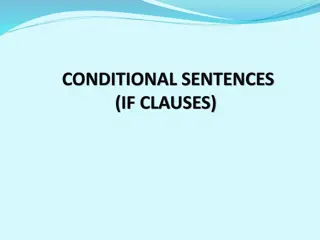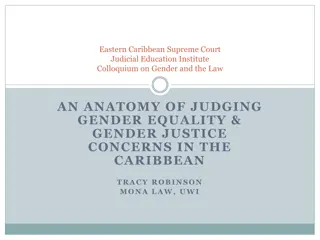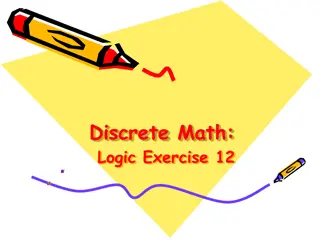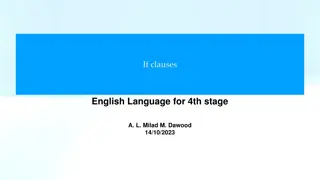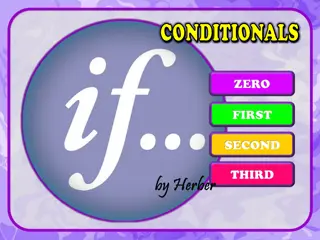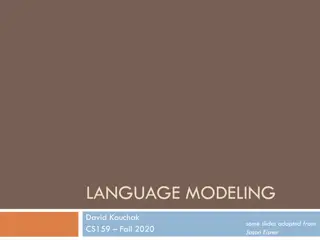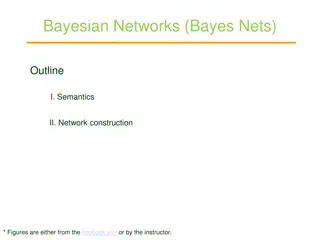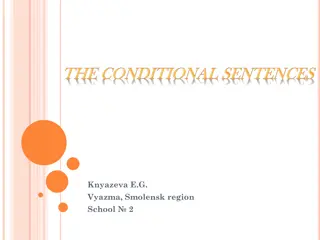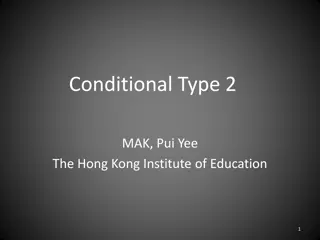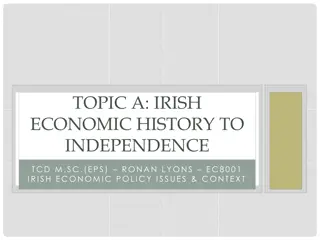Ireland's Engagement with the League of Nations: Path to Independence
Ireland's entry into the League of Nations in 1923 marked a significant step towards independence after the War of Independence and Civil War. Through joining the League and asserting its independence, Ireland demonstrated its readiness to participate in global initiatives for peace and cooperation.
4 views • 17 slides
Understanding Conditional Probability and Bayes Theorem
Conditional probability relates the likelihood of an event to the occurrence of another event. Theorems such as the Multiplication Theorem and Bayes Theorem provide a framework to calculate probabilities based on prior information. Conditional probability is used to analyze scenarios like the relati
1 views • 5 slides
Understanding Conditional Statements in Logic
Conditional statements in logic involve connecting statements with an "if-then" structure. The truth of the conclusion is dependent on the truth of the hypothesis. Explore examples, truth tables, and logical equivalences to grasp the concepts of conditional statements.
0 views • 26 slides
Understanding Conditional Clauses in English Grammar
A conditional clause is a type of adverbial clause in English grammar that states a hypothesis or condition using a conditional clause in the simple present and the main clause in the future tense. This type of clause uses modal verbs like would, should, could, will, may, might, or can. Conditional
2 views • 6 slides
Understanding Conditional Probability and Bayes Theorem
Conditional probability explores the likelihood of event A given event B, while Bayes Theorem provides a method to update the probability estimate of an event based on new information. Statistical concepts such as the multiplication rule, statistical independence, and the law of total probability ar
0 views • 15 slides
Evolution of the Indian Financial System: A Historical Perspective
The Indian Financial System has evolved through distinct phases - Pre-Independence, Post-Independence up to 1991, and post-1991. Pre-Independence saw a closed economy with limited access to foreign savings. Post-Independence witnessed significant growth, nationalization of banks and insurance, devel
0 views • 20 slides
Understanding Conditional Probability and Independence in Statistics
Conditional probability and independence are essential concepts in statistics. This lesson covers how to find and interpret conditional probabilities using two-way tables, calculate probabilities using the conditional probability formula, and determine the independence of events. Through examples li
0 views • 15 slides
Understanding the Second Conditional in English Grammar
The second conditional in English grammar is used to talk about unlikely or impossible situations in the present or future. It involves using 'if' followed by the past simple, 'would', and the infinitive. This type of conditional is different from the first conditional as it deals with less likely s
0 views • 10 slides
Understanding Negations in Quantified and Conditional Statements
Explore the concept of negations in quantified statements, where the negation of a universal statement equates to an existential statement, and vice versa. Discover the importance of negations in universal conditional statements and their relationship to logical equivalence. Dive into examples of ne
0 views • 15 slides
Exploring Unusual Activities and Second Conditional Grammar
Delve into the realm of unusual activities and learn about the second conditional grammar in this engaging study. Discover vocabulary related to hypnotism, hair dyeing, and tarantulas. Explore how the second conditional is used to discuss improbable future scenarios and present impossibilities. Unde
1 views • 9 slides
Best Practices for Independence in Implementing FASB ASC 606
Independence considerations are crucial when assisting attest clients with FASB ASC 606 implementation. General requirements and dos and don'ts must be followed to maintain independence. Factors to assess independence include client responsibility, training provided, and extent of involvement. Audit
0 views • 6 slides
Planning for Independence Program (PIP) - Empowering Students for Success
Our Planning for Independence Program (PIP) offers a 7-year alternative program to students with Intellectual Developmental Exceptionality. Through individualized education programs, students develop necessary skills for independence, including transit training, social skills, literacy, and numeracy
0 views • 9 slides
John H. Chafee Foster Care Independence Program (CFCIP) Overview
The John H. Chafee Foster Care Independence Program (CFCIP) is a federal initiative established under the Foster Care Independence Act of 1999 to support youth transitioning out of foster care. It provides various services such as job training, housing assistance, education support, and financial ai
0 views • 10 slides
The Quit India Movement: A Pivotal Moment in India's Independence Struggle
The Quit India Movement, also known as the India August Movement, was a key event in India's fight for independence led by Mahatma Gandhi in 1942. This movement urged the British to grant India independence through peaceful non-violent protests. It called for an immediate end to British rule, the fo
0 views • 15 slides
Understanding PHP Conditional Statements for Decision Making Logics
Conditional statements in PHP are essential for decision-making logics, allowing the execution of specific code blocks based on defined conditions. This article covers different types of conditional statements like if, if-else, if-elseif-else, and switch in PHP, along with syntax examples and their
0 views • 17 slides
Understanding Conditional Statements in Geometry
In this chapter of "Big Ideas Geometry," the focus is on conditional statements in geometry. Learn how to write conditional and biconditional statements, determine if statements are true or false, and explore logical implications such as converse and negation. Through examples and explanations, gras
0 views • 54 slides
Understanding Bayes Rule and Conditional Probability
Dive into the concept of Bayes Rule and conditional probability through a practical example involving Wonka Bars and a precise scale. Explore how conditional probabilities play a crucial role in determining the likelihood of certain events. Gain insights on reversing conditioning and applying Bayes
0 views • 35 slides
Conditional and Reference Class Linear Regression: A Comprehensive Overview
In this comprehensive presentation, the concept of conditional and reference class linear regression is explored in depth, elucidating key aspects such as determining relevant data for inference, solving for k-DNF conditions on Boolean and real attributes, and developing algorithms for conditional l
0 views • 33 slides
Declaration of Independence Scavenger Hunt and Discussion
Explore clues and discussions surrounding the Declaration of Independence in this engaging scavenger hunt. Discover insights into the authors' identities, the document's intended audience, grievances, and evidence supporting independence. Delve into a thought-provoking discussion on the justificatio
0 views • 8 slides
The American Revolution: Pursuit of Independence
The American Revolutionary War of 1776-1783 marked a significant turning point in history as colonists sought independence from British rule. The support for independence was fueled by figures like Thomas Paine and pivotal documents such as the Declaration of Independence. The divide among colonists
0 views • 20 slides
Causes and Reactions of the American War of Independence
The American War of Independence was fueled by various causes, including taxation without representation, economic restrictions on trade imposed by Britain, and defiance through protests like the Boston Tea Party. The colonies fought for their independence, culminating in the Declaration of Independ
0 views • 4 slides
Mexican War of Independence (1810-1821): A Historical Journey
The Mexican War of Independence (1810-1821) was a tumultuous period marked by leaders like Miguel Hidalgo and Jose Morelos who fought against Spanish rule in Mexico. Despite setbacks, the struggle for independence persisted, eventually culminating in the declaration of Mexico's independence and the
0 views • 10 slides
Understanding IF Conditionals in English Grammar
IF conditionals in English grammar introduce different kinds of conditions that may or may not happen, including the zero conditional, first conditional, second conditional, and third conditional. These conditionals are expressed through IF clauses followed by main clauses, each serving a specific p
0 views • 16 slides
Understanding the 4 Main Types of Conditional Sentences in English
Conditional sentences in English consist of two parts: the "if" clause and the main clause. There are four main types of conditional sentences - Zero Conditional, First Conditional, Second Conditional, and Third Conditional. Each type is used to express different conditions and outcomes based on cer
1 views • 16 slides
Understanding Conditional Sentences and Time Clauses
Conditional sentences are divided into real and unreal scenarios. Real conditionals, like zero and first conditionals, express present or future possibilities, while unreal conditionals, such as second and third conditionals, discuss imaginary or impossible situations. The use of "if" indicates less
0 views • 32 slides
English Grammar Practice: Conditional Sentences Type 3
Practice English grammar with a focus on conditional sentences type 3. The content includes examples and exercises to help improve understanding and usage of past perfect tense, conditionals, and past participle forms. Explore scenarios and complete sentences to enhance your skills in forming comple
0 views • 14 slides
Understanding Conditional Sentences (If Clauses) in English Grammar
This content provides insights into conditional sentences (if clauses) in English grammar, focusing on the First Conditional for talking about possible future events or situations. It explains the structure, usage, and examples of First Conditional sentences in different contexts such as predictions
0 views • 7 slides
Gender Equality and Judicial Independence in the Caribbean
This content explores the role of judges in promoting gender equality and justice in the Caribbean region, discussing preliminary points, judicial independence, and the rule of law. It emphasizes the importance of judges maintaining professional competence and independence to address gender equality
0 views • 30 slides
Conditional Statements in Discrete Math: Logic Exercise Solutions
Practice writing conditional statements in English for various scenarios such as weather conditions, achievements, requirements, and guarantees. Understand the antecedent and consequent relationship in logic exercises. Common ways to express conditional statements explained with examples.
0 views • 5 slides
Understanding If Clauses in English Grammar
If clauses are a vital aspect of English grammar, serving to express conditions that must be met for specific outcomes. They come in four types, including the zero conditional for facts, the second conditional for unlikely situations, and the third conditional for past hypothetical scenarios. While
0 views • 28 slides
English Conditional Sentences Practice Examples with Images
Explore a collection of English conditional sentences practice examples with accompanying images. From zero conditional to third conditional, learn how to construct sentences using different tenses and structures. Enhance your understanding of if-clauses and main clauses through these visual aids.
0 views • 21 slides
Understanding Independence in Probability: A Comprehensive Overview
Explore the concepts of independence and conditional independence in probability, with examples like coin tosses, dice rolls, and real-world scenarios. Learn how knowing the value of one variable affects the probability distribution of another, and how to calculate probabilities under independence a
0 views • 56 slides
Understanding First Conditional Sentences with Examples
Learn about first conditional sentences in English grammar, how to form them using "if" and "will", and practice with various examples. Understand the usage of first conditional for future actions dependent on fulfilling certain conditions. Improve your understanding through examples and exercises p
0 views • 10 slides
First Conditional: Understanding and Examples
Explore the First Conditional tense with examples and practice exercises. Understand how to form conditional sentences with "if" clauses and main clauses. See how actions in the future depend on fulfilling certain conditions, illustrated through clear examples and explanations.
0 views • 10 slides
Perspectives on Autonomy and Independence in Older Age
Understanding the perspectives on autonomy and independence in older age, as shared by individuals from 24 countries through a consultation conducted by various organizations. Older people express the importance of making their own decisions, the impact of health on independence, challenges in maint
0 views • 13 slides
Understanding Bayesian Networks: A Comprehensive Overview
Bayesian networks, also known as Bayes nets, provide a powerful tool for modeling uncertainty in complex domains by representing conditional independence relationships among variables. This outline covers the semantics, construction, and application of Bayesian networks, illustrating how they offer
0 views • 17 slides
Understanding Conditional Sentences: Types and Usage Explained
Conditional sentences are complex sentences with a subordinate clause of condition, usually starting with "IF". Learn about zero, first, second, third, and mixed conditional sentences, their structures, and examples to enhance your understanding and usage of different types of conditionals.
0 views • 13 slides
Conditional Type 2 - If I Had a Million Dollars Revision
Learn about the second conditional type and practice forming conditional sentences using "If I had a million dollars" scenario. Understand the usage of the 1st conditional for discussing possible future situations and explore the consequences of hypothetical scenarios like having a bird on your head
0 views • 22 slides
Understanding Conditional Discharge in Mental Health: A Comprehensive Guide
Explore the complexities of conditional discharge in mental health, from its definition to planning for discharge and post-discharge care. Learn about conditions, frameworks, and recall procedures associated with this critical process. Delve deeper into the nuanced aspects of managing risks and prot
0 views • 31 slides
Irish Economic History to Independence: Overview and Perspectives
Explore the economic history of Ireland leading up to independence, including key events, policies, and perspectives on economic performance. Topics cover trade policy, fiscal and monetary policy at independence, readings, and the structure of economic history since independence.
0 views • 25 slides

